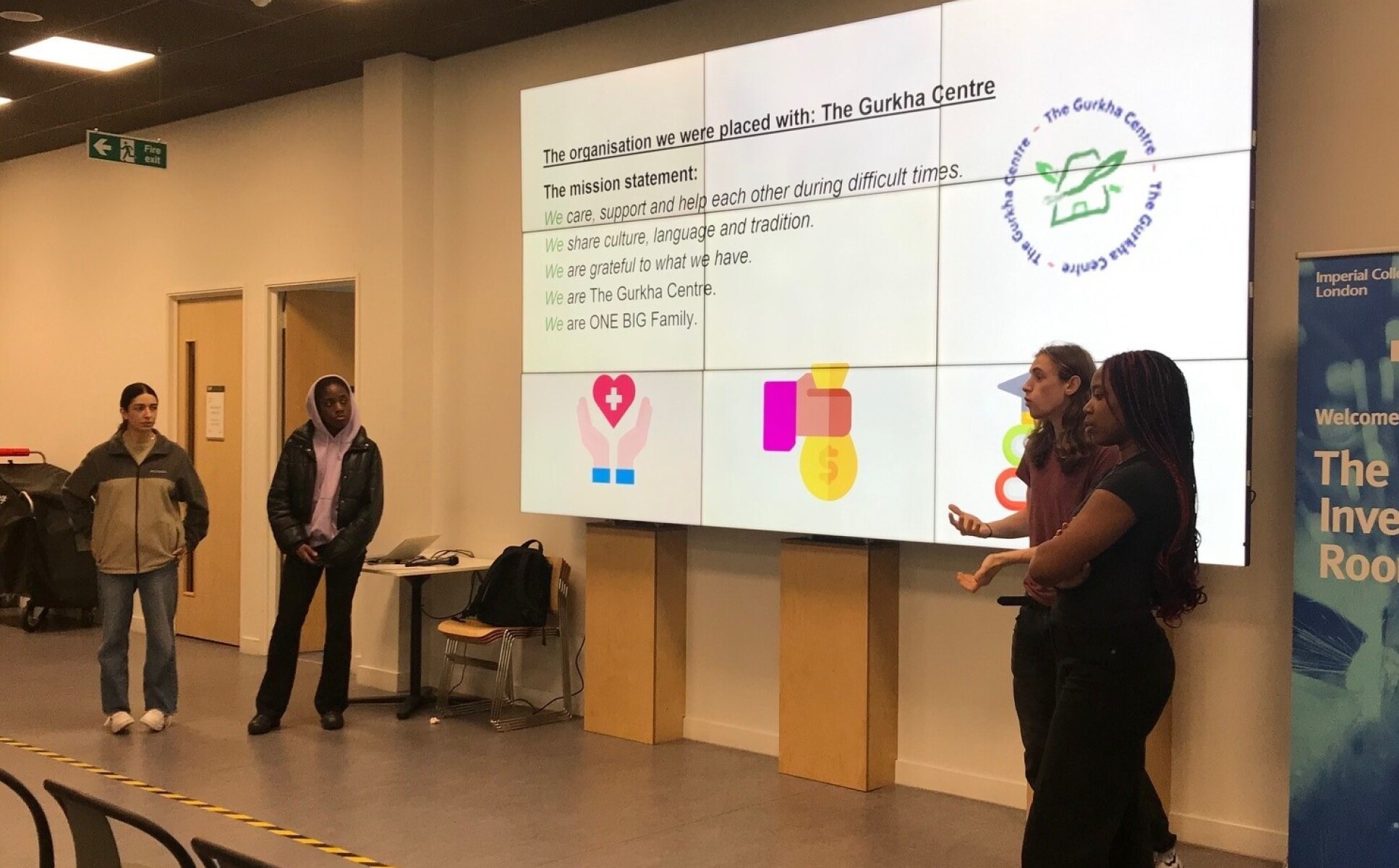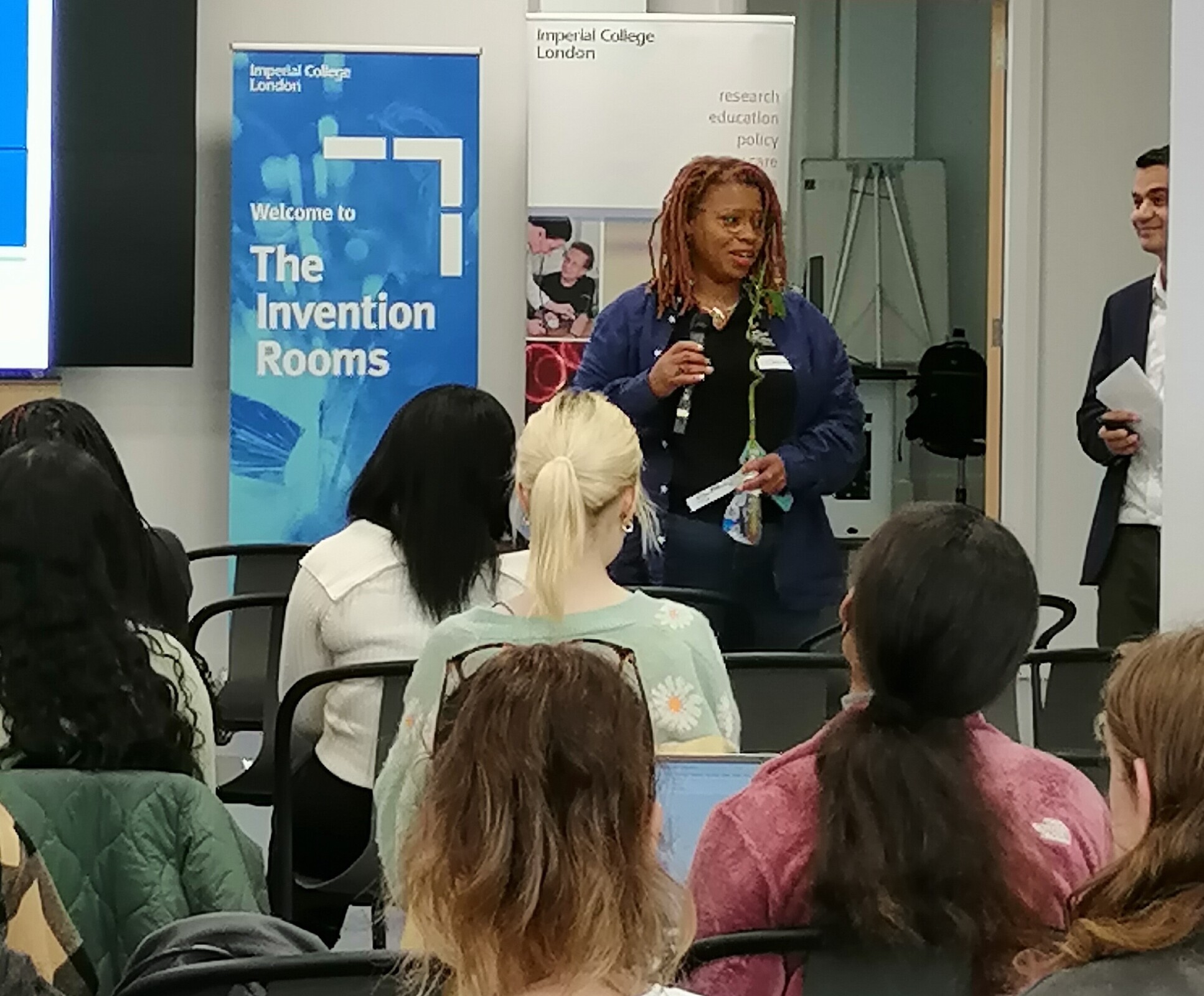Global Health students combine with London community groups to dynamic effect
by Emily Govan

Global Health BSc students present their work with community organisations
Students from Imperial’s BSc in Global Health presented their community placement experiences at a lively event at Imperial’s Invention Rooms.
The Global Health Societal Impact Afternoon took place on 28 April 2023, at the unique Invention Rooms space, White City, where Imperial and the local community come together to collaborate, innovate and make.
The event showcased an innovative education scheme on the Global Health BSc, where students learn about global health and inequalities through collaborative work with local health and wellbeing voluntary sector organisations, lending their skills and time to effect change in their community. For the last few years, the students have reported back and reflected on their experience of working with their community partners and peers.
Last week’s event provided an opportunity to hear about the collaborative projects that the students have completed with CGP (community group placement) organisations over the last term. 26 students took part in this year’s project, alongside six different community groups.
This year students partnered with a range of community partners: FORWARD(Foundation for women’s health, research and development), Hammersmith Community Gardens Association, One Westminster, The Gurkha Centre, Young Brent Foundation and Young Hammersmith & Fulham Foundation.
Contributing to community health and well-being
"Collaborations between colleges and communities provide medical students with opportunities to develop a genuine understanding of global health concerns." Dr Shyam Budhathoki BSc Global Health Coordinator
Dr Shyam Budhathoki, BSc Global Health Coordinator and Community Groups Placements Module Lead, said: ‘Partnerships and collaboration between colleges and communities in education provide medical students with opportunities to develop a genuine understanding of global health concerns in the local population, while also contributing to the enhancement of community health and well-being’.
Students from previous years have reported the placement partnership between students and community organizations benefits both parties by allowing students to gain skills in project leadership and management at the same time as providing an external view of the organization's services, whilst communities benefit from sharing their needs and priorities to help shape future health professionals' priorities and co-design voluntary-sector initiatives.
One of this year's student groups was placed with the Gurkha Centre, a help centre which enables Gurkha Veterans, their families and their wider community to live their lives in dignity, providing support and assistance that help them navigate the challenges of daily life, whether it be technology or healthcare, finances or social activities.
Bhim Tamang, Founder & CEO of the Gurkha Centre, said: ‘For the past three years we have participated in this mutually beneficial educational partnership project with the College. It has been rewarding to introduce future doctors to our community through this placement opportunity, and we are excited to hear that they have gained valuable knowledge and information on social determinants of health. As a community, we take pride in helping them understand our crucial role in identifying and addressing health and welfare issues for the Gurkha Nepalese community in West London and beyond. Additionally, the service evaluation conducted by the students has provided us with valuable input on improving our services’.
The students saw that the centre had no effective online and social media presence and that there was a lack of health access and support for the Gurkha community. They came up with the idea of a volunteer recruitment booklet that contained information about the Gurkha community and its health profile, detailed the mission of the centre and why support is needed, and showed a range of roles that volunteers can take on. They also developed a publicity and distribution plan for the booklet as well as a dedicated website.
"Having an insight into a specific community group and the needs and support they require and being able to contribute was exciting. I want to give back to society". Ibukunoluwa King Medical student
Imperial medical student Ibukunoluwa King said: ‘Having an insight into a specific community group and the needs and support they require and being able to contribute to developing initiatives to meet their needs was exciting. It’s all about a volunteering mindset, I want to explore that sector and give back to society’.
Another group was placed with the Young Brent Foundation, a charitable, independent voluntary sector body that works across public, private and voluntary sectors to support young people’s long-term mental health and wellbeing, particularly those from the BAME community.
The foundation plays a vital role in improving the health and wellbeing of the local population, especially those who may not access NHS services otherwise due to a variety of factors.
The students discovered that COVID had exacerbated underlying and long-existing health inequalities and that there were intensified mental health and wellbeing problems in the Afro-Caribbean and Asian communities. Poor mental health and wellbeing can have detrimental effects in all areas of life, including schooling, family relations and roles in the community, preventing individuals from thriving and reaching their potential.
The student group designed an online survey and worked with partner organisations to deliver it to young people in Brent, then reviewed the feedback. They suggested a peer-to-peer mentoring scheme, training older students, and recommended that group mentorship sessions or one-to-one sessions could be offered. 
Carole Thompson, Youth Engagement Manager, Young Brent Foundation, said: ‘This is a fantastic initiative to work collaboratively with Imperial students - future doctors and medics - creating an opportunity to provide some insight into the mental health needs of some of the local young people Young Brent Foundation members work with’.
Medical student Chayna Tae said: ‘This was a great opportunity to engage with the community and learn about all the work that’s done. It was an insightful experience into understanding how a CBO works that you might not see on the service level. It was really rewarding and we gained a greater knowledge of the mental health of youth and its related issues’.
Community expectations from future doctors
The afternoon was completed by a facilitated panel discussion on the community’s expectations from future doctors, chaired by Dr Richard Pinder, looking at the community’s expectations from future doctors with CGP partners and an informal networking session.
The panel discussed the challenges facing the healthcare sector and the importance of community organisations to support this. Panel members highlighted the importance of preventative health and taking a holistic approach to working with patients.
Dr Richard Pinder, course director, said, ‘Our voluntary and community sector (VCS) partners play a crucial role in local communities – tirelessly working, often in the background, amid huge financial constraints. They possess an in-depth understanding of the communities in which we all work. Collaborating with our VCS partners offers Public Health and the NHS insight, connection and capability to improve population health. In this program, our Global Health students work alongside our VCS partners. This ensures that the sector is firmly on their radar when they become NHS doctors and leaders of the future.’
Article text (excluding photos or graphics) © Imperial College London.
Photos and graphics subject to third party copyright used with permission or © Imperial College London.
Reporter
Emily Govan
Department of Life Sciences